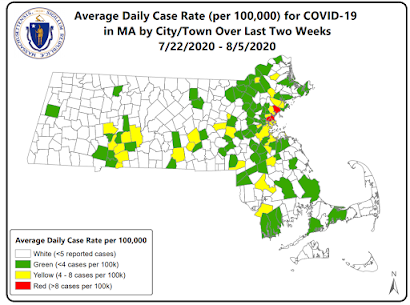Last week, Governor Charlie Baker announced a new set of initiatives aimed at stopping the spread of COVID-19 in Massachusetts, especially in higher risk communities that have seen a recent uptick in cases. While Massachusetts has seen an overall decrease in COVID-19 cases and hospitalizations since May, there has been a slight uptick in certain communities in recent days.
The Administration today released data on the average daily cases per 100,000 residents, average percent positivity, and positive tests, for all 351 Massachusetts cities and towns over the last two weeks.
Based on the average daily cases per 100,000 residents, each city or town has been designated as a higher risk, moderate risk, or lower risk community. Going forward, this information will be updated and included in the Department of Public Health’s weekly public health dashboard, which is published each Wednesday.
Any city or town designated higher risk is considered to have a high level of COVID infection, and will receive additional support from the Commonwealth to address the spread of the virus.
Last week, Governor Baker announced a targeted cross-agency COVID Enforcement and Intervention Team that will be responsible for ramping up enforcement statewide and coordinating intervention efforts at the local level in these higher risk COVID-19 communities.
Member agencies include the Executive Office and Public Safety and Security (EOPSS) and the Massachusetts Emergency Management Agency (MEMA), who will serve as coordinators of the team, the Command Center, the Massachusetts State Police (MSP), the Department of Labor Standards (DLS), the Division of Professional Licensure (DPL), the Department of Public Health (DPH), the Division of Local Services (DLS), the Alcoholic Beverages Control Commission (ABCC) and the Executive Office of Technology Services and Security (EOTSS).
Statewide Enforcement and Intervention supports will include:
Targeted interventions and inspections by a range of member agencies, including Local Services, Labor Standards, DPH, MSP and ABCC, coordinated by EOPSS and MEMA.
Increased enforcement, including fines, of sector guidance for businesses to ensure businesses and residents are aware of and following COVID-19 orders.
Cease and desist orders as necessary for businesses and organizations in violation of the COVID-19 orders.
Support for ABCC and local licensing boards in exercising their existing authority to fine restaurants or suspend or cancel liquor licenses when restaurants do not comply with required COVID-19 safety measure or sanitation codes.
Targeted public messaging to alert residents of higher risk COVID communities (road signs, PSAs, reverse 911, etc.).
Technical support to local government officials to support enhanced local COVID-19 prevention efforts such as assistance in accessing CARES Act funding.
Potential restrictions or shutdowns for parks, playgrounds, businesses or other entities and locations believed to be contributing to the COVID-19 spread in higher risk COVID-19 communities.
Additional public health support such as testing, tracing and quarantining.
The Administration today released data on the average daily cases per 100,000 residents, average percent positivity, and positive tests, for all 351 Massachusetts cities and towns over the last two weeks.
Based on the average daily cases per 100,000 residents, each city or town has been designated as a higher risk, moderate risk, or lower risk community. Going forward, this information will be updated and included in the Department of Public Health’s weekly public health dashboard, which is published each Wednesday.
Any city or town designated higher risk is considered to have a high level of COVID infection, and will receive additional support from the Commonwealth to address the spread of the virus.
Last week, Governor Baker announced a targeted cross-agency COVID Enforcement and Intervention Team that will be responsible for ramping up enforcement statewide and coordinating intervention efforts at the local level in these higher risk COVID-19 communities.
Member agencies include the Executive Office and Public Safety and Security (EOPSS) and the Massachusetts Emergency Management Agency (MEMA), who will serve as coordinators of the team, the Command Center, the Massachusetts State Police (MSP), the Department of Labor Standards (DLS), the Division of Professional Licensure (DPL), the Department of Public Health (DPH), the Division of Local Services (DLS), the Alcoholic Beverages Control Commission (ABCC) and the Executive Office of Technology Services and Security (EOTSS).
Statewide Enforcement and Intervention supports will include:
Targeted interventions and inspections by a range of member agencies, including Local Services, Labor Standards, DPH, MSP and ABCC, coordinated by EOPSS and MEMA.
Increased enforcement, including fines, of sector guidance for businesses to ensure businesses and residents are aware of and following COVID-19 orders.
Cease and desist orders as necessary for businesses and organizations in violation of the COVID-19 orders.
Support for ABCC and local licensing boards in exercising their existing authority to fine restaurants or suspend or cancel liquor licenses when restaurants do not comply with required COVID-19 safety measure or sanitation codes.
Targeted public messaging to alert residents of higher risk COVID communities (road signs, PSAs, reverse 911, etc.).
Technical support to local government officials to support enhanced local COVID-19 prevention efforts such as assistance in accessing CARES Act funding.
Potential restrictions or shutdowns for parks, playgrounds, businesses or other entities and locations believed to be contributing to the COVID-19 spread in higher risk COVID-19 communities.
Additional public health support such as testing, tracing and quarantining.













